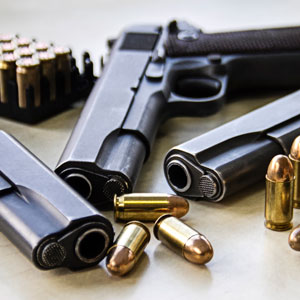An LMC has issued a template letter for practices to turn down police requests for information on firearms licence applicants, pointing out that most GPs are not suitably qualified.
The template, from Devon LMC, states that GPs do not have the expertise to diagnose a personality disorder, which is the ’major clinical issue giving rise to the improper use of firearms’.
The process for issuing firearms licences was changed on 1 April after negotiations between the BMA Professional Fees Committee and the Home Office.
It means that after a licence is issued, the police will now contact the applicant’s GP to determine whether there are any issues relating to gun ownership (such as a history of depression) and for the GP to place a firearms reminder code on the patient record.
But Dr Mark Sanford-Wood, who drafted the Devon LMC letter, told Pulse that they produced this letter because ‘our members are at really significant risk if they try to offer an opinion that they’re not qualified to offer’.
He added: ‘I understand that if that letter is used in any kind of widespread way across the country that this system that was introduced on 1 April will collapse… but that doesn’t mean we shouldn’t do it.’
The letter, addressed to the firearms licencing department, states: ‘You have asked me if I have any concerns regarding the issuing of a firearms licence to this individual, and you therefore seek my professional opinion rather than a simple report of the medical facts.’
It goes onto say: ‘It is widely accepted that the major clinical issue giving rise to the improper use of firearms is the presence of a personality disorder. To give a professional opinion on such a diagnosis one would need to conduct a specific examination for personality disorder and have special expertise. Such expertise would, at a minimum, require approval under section 12 of the Mental Health Act 1983 (as amended 2007).’
The letter concludes ’I am therefore not qualified to offer the expert professional opinion you seek and would suggest that you approach an appropriately qualified psychiatrist who may be able to help you in this regard.’
The LMCs conference last month overwhelmingly passed a motion urging the GPC to work with the BMA Professional Fees Committee to revise the system and ‘actively support GPs refusing to participate in this process’ until it is changed so that certificates are only approved after GP involvement and there is clarification regarding payment and ‘the medico-legal validity of the process’.
Current BMA guidance states that this system is not part of the GP contract and GPs can choose to charge a fee to the patient (though not police) for responding to the request, or refuse the request by notifying the police as soon as possible if the practice ’does not have the capacity to undertake the work within the 21 days’.
Devon LMC has also produced template letters for GPs who were willing to produce a firearms certificate with options to send it back, charge the patient or charge the police.
Dr Sanford-Wood told Pulse that they included these options because some GPs may be happy to offer their opinion and that since the police requests the GP’s opinion, it would be unusual for someone else – the patient – to pay the charge.
Pulse October survey
Take our July 2025 survey to potentially win £1.000 worth of tokens













